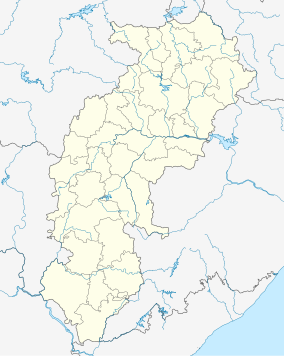Indravati National Park is a national park located in Bijapur district of Chhattisgarh state in India.[1] The park derives its name from the Indravati River, which flows from east to west and forms the northern boundary of the reserve with the Indian state of Maharashtra.
| Indravati National Park | |
|---|---|
| Indravati Tiger Reserve | |
| Location | Bijapur district, Chhattisgarh, India |
| Nearest city | Jagdalpur |
| Coordinates | 19°12′18″N 81°1′53″E / 19.20500°N 81.03139°E |
| Area | 1,258.37 km2 (485.86 sq mi) |
| Established | 1975 |
| Governing body | Conservator of Forest (Field Director) |
| web | |
Indravati National Park is among the most famous wildlife parks of Chhattisgarh. It is one of four Project Tiger sites in Chhattisgarh, along with Udanti-sitanadi, and is home to one of the last remaining populations of the endangered wild water buffalo. With a total area of approximately 2799.08 km2, Indravati attained the status of a national park in 1981 and a tiger reserve in 1983, becoming one of the most famous tiger reserves in India.
As of 2022, the park is reported to be largely under Naxal control.[2]
Topography
editThe topography of the park mainly comprises undulating hilly terrain with altitude ranging between 177 and 599 metres above the sea level.
Flora
editThe vegetation of the Indravati National Park is mainly of the tropical moist and dry deciduous type with predominance of bamboo, Sarai and teak. There are also patches of grassland providing food to large herbivores such as wild water buffalos, chital, barking deer, nilgai, and gaurs. The most common tree in the park are teak, lendia, salai, mahua, tendu, semal, haldu, Boir and Jam.
Wildlife
editIndravati National Park has one of the last populations of the endangered wild Asian buffalo. The national park is also home to a variety of other ungulate species. Reported from the area are Asian elephant, gaur (Indian bison), nilgai, blackbuck, chausingha (four-horned antelope), sambar, chital, Indian muntjac, Indian spotted chevrotain and wild boar. Large predators are represented by tigers, leopards, sloth bears, and dholes (wild dogs). Smaller mammals include flying squirrel, porcupine, pangolins, rhesus monkeys and langurs among many others.[3] The commonly found reptiles in the park are freshwater crocodile, monitor lizard, Indian chameleon, common krait, Indian rock python, cobra and Russell's viper to name a few. The park also gives shelter to the large variety of birds of which the hill myna is the most important species.
Transport
editIndravati National Park is easily approachable from Jagdalpur. The village Kutrue, the main entry point of the park, is situated at the distance of 22.4 km north of Jagdalpur-Bhopalpattanam road. The Kutrue link road is at the distance of 145.6 km from Jagdalpur. Raipur (486 km) has the nearest airport and Jagdalpur (168 km) is the nearest railhead from the Indravati National Park.
Visiting
editThe recommended season to visit the park is from 15 December to 15 June.
See also
editReferences
edit- ^ "Chhattisgarh Forest Department Welcomes You". forest.cg.gov.in. Archived from the original on 11 October 2011. Retrieved 11 October 2011.
- ^ "Maoist movement in core area of Kanha tiger reserve; security posts to be set up". 26 May 2022.
- ^ D. K. Harshey & Kailash Chandra (2001). Mammals of Madhya Pradesh and Chhattisgarh. Zoos´ Print Journal 16(12): 659-668 online Archived 2 June 2018 at the Wayback Machine
